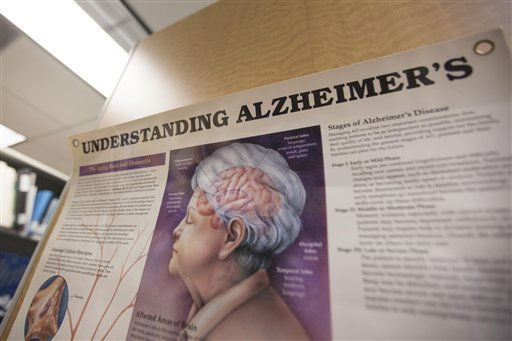Alzheimer's disease has long been said to be the sixth leading cause of death in America, but a new study indicates it may be much more common.
The study, published earlier this month in the online issue of Neurology, the medical journal of the American Academy of Neurology, suggests that Alzheimer's disease may fall just behind the No. 1 heart disease and No. 2 cancer as a cause of death.
Whether dementia is No. 6, No. 2 or No. 10, it's too common. And most of us have far too little understanding of it and its consequences -- even if we, or someone we love, never get it.
Alzheimer's disease kills one in three seniors in America. But this disease that eats away at memory and thinking ability is expected to triple in prevalence by 2050 simply by virtue of the number of aging baby boomers.
As for the study, the cause-of-death numbers are based on what is reported on death certificates, and Alzheimer's -- along with other dementias -- is under-reported on those certificates and medical records.
"Death certificates often list the immediate cause of death, such as pneumonia, rather than listing dementia as an underlying cause," said study author Dr. Bryan D. James of Rush University Medical Center in Chicago.
A recent Chattanooga tragedy is an example of Alzheimer's far-reaching ramifications. Ronald Westbrook, a 72-year-old Alzheimer's victim, was shot by a man who thought him a prowler in the middle of the night. Investigators believe Westbrook had become lost while walking his dogs. They have speculated that he thought the door he knocked on and rattled was his own. The Georgia Bureau of Investigation listed the cause of death as homicide.
Alzheimer's already is a heart-breaker, as well as a burden to caregivers and health care budgets.
With a rising recognition that it is considerably more widespread than we have believed, it grows more urgent every day that the disease receive more research.
This is true not just because a diagnosis of Alzheimer's is a death sentence, but primarily because the disease steals not only memory, but also cognitive function -- the ability to think, including the memory of how to walk and talk.
Unlike victims of heart disease and cancer, Alzheimer's patients are often in need of 24-hour care over far longer periods of time. They often have the minds of preschool children, but the impulses and motor skills of an ordinary adult. Once the motor skills slow and confine them to beds or wheelchairs, they still linger for long periods with a completely incurable illness that requires full-time care.
The Alzheimer's Association predicts that by 2050, U.S. costs for caring for the dementia population will total $1.2 trillion. To compare, the total cost worldwide in 2010 was about $604 billion.
"If dementia were a country, it would be the world's 21st largest economy, ranking between Poland and Saudi Arabia," according to the World Alzheimer's Report.
This is a relentless, heartless, immutable disease that today cannot be prevented, cured or delayed.
We have to change this. We have to give this problem much greater attention -- sooner, rather than later.

